- Home
- Brand, Max
the Garden Of Eden (1963) Page 5
the Garden Of Eden (1963) Read online
Page 5
Hold yourself ready; sharp at the end of ninety days, come West if I'm still silent.
As ever, BEN.
Before the mail took that letter eastward, Ben Connor received his final advice from Jack Townsend. It was under the hotel man's supervision that he selected his outfit of soft felt hat, flannel shirts, heavy socks, and Napatan boots; Townsend, too, went with him to pick out the pack mule and all the elements of the pack, from salt to canned tomatoes.
As for the horse, Townsend merely stood by to admire while Ben Connor went through a dozen possibilities and picked a solidly built chestnut with legs enough for speed in a pinch, and a flexible fetlock--joints that promised an easy gait.
"You won't have no trouble," said Townsend, as Connor sat the saddle, working the stirrups back and forth and frowning at the creaking new leather. "Wherever you go you'll find gents ready to give you a hand on your way."
"Why's that? Don't I look like an old hand at this game?"
"Not with that complexion; it talks city a mile off. If you'd tell me where you're bound for--"
"But I'm not bound anywhere," answered Connor. "I'm out to follow my nose."
"With that gun you ought to get some game."
Connor laid his hand on the butt of the rifle which was slung in a case under his leg. He had little experience with a gun, but he said nothing.
"All trim," continued Townsend, stepping back to look. "Not a flaw in the mule; no sign of ringbone or spavin, and when a mule ain't got them, he's got nothin' wrong. Don't treat him too well. When you feel like pattin' him, cuss him instead. It's mule nature to like a beatin' once in a while; they spoil without it, like kids. He'll hang back for two days, but the third day he'll walk all over your hoss; never was a hoss that could walk with a mule on a long trip. Well, Mr. Connor, I guess you're all fixed, but I'd like to send a boy along to see you get started right."
"Don't worry," smiled Connor. "I've written down all your suggestions."
"Here's what you want to tie on to special," said the fat man. "Don't move your camp on Fridays or the thirteenth; if you come nigh a town and a black cat crosses your trail, you camp right there and don't move on to that town till the next morning. And wait a minute--if you start out and find you've left something in camp, make a cross in the trail before you go back."
He frowned to collect his thoughts.
"Well, if you don't do none of them three things, you can't come out far wrong. S'long, and good luck, Mr. Connor."
Connor waved his hand, touched the chestnut with his heel and the horse broke into a trot, while the rope, coming taut, first stretched the neck of the mule and then tugged him into a dragging amble. In this manner Connor went out of Lukin. He smiled to himself, as he thought confidently of the far different fashion in which he would return.
The first day gave Connor a raw nose, a sunburned neck and wrists, and his supper was charred bacon and tasteless coffee; but the next morning he came out of the choppy mountains and went down a long, easy slope into the valley of the Girard. There was always water here, and fine grass for the horse and mule, with a cool wind off the snows coming down the ravine. By the third day he was broken into the routine of his work and knew the most vulnerable spot on the ribs of the mule, and had a pet name for the chestnut. Thereafter the camping trip was pleasant enough.
It took him longer than he had expected, for he would not press the horse as the pitch of the ravine grew steeper; later he saw his wisdom in keeping the chestnut fresh for the final burst, for when he reached the head-spring of the Girard, he faced a confusion of difficult, naked mountains. He was daunted but determined, and the next morning he filled his canteens and struck into the last stage of his journey.
Luck gave him cool weather, with high moving clouds, which curtained the sun during the middle of the day, but even then it was hard work. He had not the vestige of a trail to follow; the mountain sides were bare rock.
A scattering of shrubs and dwarfed trees found rooting in crevices, but on the whole Connor was journeying through a sea of stone, and sometimes, when the sun glinted on smooth surface, the reflection blinded him. By noon the chestnut was hobbling, and before nightfall even the mule showed signs of distress. And though Connor traveled now by compass, he was haunted by a continual fear that he might have mistaken his way, or that the directions he had picked up at Lukin might be entirely wrong. Evening was already coming over the mountains when he rounded a slope of black rock and found below him a picture that tallied in every detail with all he had heard of the valley.
The first look was like a glance into a deep well of stone with a flash of water in the bottom; afterward he sat on a boulder and arranged the details of that big vista. Nothing led up to the Garden from any direction; it was a freak of nature. Some convulsion of the earth, when these mountains were first rising, perhaps, had split the rocks, or as the surface strata rolled up, they parted over the central lift and left this ragged fissure. Through the valley ran a river, but water could never have cut those saw-tooth cliffs; and Connor noted this strange thing: that the valley came to abrupt ends both north and south. By the slant sunlight, and at that distance--for he judged the place to be some ten or fifteen miles in length--it seemed as if the cliff fronts to the north and south were as solid and lofty as a portion of the sides; yet this could not be unless the river actually disappeared under the face of the wall. Still, he could not make out details from the distance, only the main outline of the place, the sheen of growing things, whether trees or grass, and the glitter of the river which swelled toward the center of the valley into a lake. He could discover only one natural entrance; in the nearest cliff wall appeared a deep, narrow cleft, which ran to the very floor of the valley, and the only approach was through a difficult ravine. The sore-footed chestnut had caught the flash of green, and now he pricked his ears and whinnied as if he saw home.
Connor started down the rocks toward the entrance, leading the horse, while the mule trailed wearily behind. As he turned, the wind blew to him out of the valley a faint rhythmical chiming. When he paused to listen the sound disappeared.
He dipped out of the brighter level into a premature night below; evening was gathering quickly, and with each step Connor felt the misty darkness closing above his head. He was stumbling over the boulders, downheaded, hardly able to see the ground at his feet, yet when he reached the bottom of the little ravine which ran toward the entrance, he looked up to a red sky, and the higher mountains rolled off in waves of light. Distances were magnified; he seemed to look from the bottom of the world to the top of it; he turned, a little dizzy, and between the edges of the cleft that rose straight as Doric pillars, he saw a fire burning at the entrance to the Garden of Eden. The sunset was above them, but the fire sent a long ray through the night of the lower valley. Connor pointed it out to his horse, and the little cavalcade went slowly forward.
Chapter EIGHT
With every step that he took into the darkness the feeling of awe deepened upon Connor, until he went frowning toward the fire as though it were an eye that watched his coming. He was quite close when the chestnut threw up its head with a snort and stopped, listening; Connor listened as well, and he heard a music of men's voices singing together, faint with distance; the sound traveled so far that he caught the pulse of the rhythm and the fiber of the voices rather than the tune itself, yet the awe which had been growing in Connor gathered suddenly in his throat. He had to close his hands hard to keep from being afraid.
As though the chestnut felt the strangeness also, he neighed suddenly; the rock walls of the ravine caught up the sound and trumpeted it back.
Connor, recovering from the shock, buried his fingers in the nostrils of the horse and choked the sound away; but the echo still went faintly before them and behind. The alarm had been given. The fire winked once and went out. Connor was left without a light to guide him; he looked up and saw that the sunset flush had fallen away to a dead gray.
He looked ahead to where
the fire had been. Just then the horse jerked his nose away and gasped in a new breath. Even that slight sound flurried Connor, for it might guide the unknown danger to him. Connor remembered that after all he was not a bandit stealing upon a peaceful town; he composed his mind and his nerves with an effort, and was about to step forward again when he saw in the night just before him a deeper shade among the shadows. Peering, he discovered the dim outlines of a man.
Ben Connor was not a coward, but he was daunted by this apparition. His first impulse was to flee; his second was to leap at the other's throat.
It spoke much for his steadiness in a crisis that he did neither, but called instead: "Who's there?"
Metal gritted on metal, and a shaft of light poured into Connor's face so unexpectedly that he shrank. The chestnut reared, and turning to control the horse, Connor saw his eyes and the eyes of the mule shining like phosphorus. When he had quieted the gelding he saw that it was a hooded lantern which had been uncovered. Not a ray fell on the bearer of the light.
"I saw a light down here," said Connor, after he had tried in vain to make out the features of the other. "It looked like a fire, and I started for it; I've lost my bearing in these mountains."
Without answering, the bearer of the lantern kept the shaft staring into Connor's face for another moment; then it was as suddenly hooded and welcome darkness covered the gambler. With a gesture which he barely could make out, the silent man waved him forward down the ravine. It angered Connor, this mummery of speechlessness, but with his anger was an odd feeling of helplessness as though the other had a loaded gun at his head.
The man walked behind him as they went forward, and presently the fire shone out at them from the entrance to the valley; thus Connor saw the blanket which had screened the fire removed, and caught a glimpse of a second form.
Even the zenith was dark now, and it was double night in the ravine.
With the chestnut stumbling behind him, Connor entered the circle of the fire and was stopped by the raised hand of the second man.
"Why are you here?" said the guard.
The voice was thin, but the articulation thick and soft, and as the questioner stepped into the full glow of the fire, Connor saw a Negro whose head was covered by white curls. He was very old; it seemed as though time had faded his black pigment, and now his skin, a dark bronze, was puckered at the corners of his mouth, about his eyes, and in the center of his forehead, seeming to have dried in wrinkles like parchment. While he talked his expression never varied from the weary frown; yet years had not bowed him, for he stood straight as a youth, and though his neck was dried away until it was no thicker than a strong man's forearm, he kept his head high and looked at Connor.
The man who had gone out to stop Connor now answered for him, and turning to the voice the gambler saw that this fellow was a Negro likewise; as erect as the one by the fire, but hardly less ancient.
"He is lost in the mountains, and he saw the fire at the gate, Ephraim."
Ephraim considered Connor wistfully.
"This way is closed," he said; "you cannot pass through the gate."
The gambler looked up; a wall of rock on either side rose so high that the firelight failed to carry all the distance, and the darkness arched solidly above him. The calm dignity of the men stripped him of an advantage which he felt should be his, but he determined to appear at ease.
"Your best way," continued Ephraim, "is toward that largest mountain.
You see where its top is still lighted in the west, while the rest of the range is black.
"Jacob can take you up from the ravine and show you the beginning of the way. But do not pass beyond the sight of the fire, Jacob."
"Good advice," nodded Connor, forcing himself to smile, "if it weren't that my horse is too sore-footed to carry me. Even the mule can hardly walk--you see."
He waved his hand and the chestnut threw up its head and took one or two halting steps to the side.
"In the meantime, I suppose you've no objection if I sit down here for a moment or two?"
Ephraim, bowing as though he ushered the other into an apartment of state, waved to a smooth-topped boulder comfortably near the fire.
"I wish to serve you," he went on, "in anything I can do without leaving the valley. We have a tank just inside the gate, and Jacob will fill your canteen and water the horse and mule as well."
"Kind of you," said Connor. "Cigarette?"
The proffered smoke brought a wrinkling of amazed delight into the face of Ephraim and his withered hand stretched tentatively forth. Jacob forestalled him with a cry and snatched the cigarette from the open palm of Connor. He held it in both his cupped hands.
"Tobacco--again!" He turned to Ephraim. "I have not forgotten!"
Ephraim had folded his arms with dignity, and now he turned a reproving glance upon his companion.
"Is it permitted?" he asked coldly.
The joy went out of the face of Jacob.
"What harm?"
"Is it permitted?" insisted Ephraim.
"He will not ask," argued Jacob dubiously.
"He knows without asking."
At this, very slowly and unwillingly, Jacob put the cigarette back into the hand of Ben Connor. A dozen curious questions came into the mind of the gambler, but he decided wisely to change the subject.
"The boss gives you orders not to leave, eh?" he went on. "Not a step outside the gate? What's the idea?"
"This thing was true in the time of the old masters. Only Joseph can leave the valley," Ephraim answered.
"And you don't know why no one is allowed inside the valley?"
"I have never asked," said Ephraim.
Connor smoked fiercely, peering into the fire.
"Well," he said at length, "you see my troubles? I can't get into the valley to rest up. I have to turn around and try to cross those mountains."
"Yes," nodded Ephraim.
"But the horse and mule will never make it over the rocks. I'll have to leave them behind or stay and starve with them."
"That is true."
"Rather than do that," said Connor, fencing for an opening, "I'd leave the poor devils here to live in the valley."
"That cannot be. No animals are allowed to enter."
"What? You'd allow this pair to die at the gate of the valley?"
"No; I should lead them first into the mountains."
"This is incredible! But I tell you, this horse is my friend--I can't desert him!"
He fumbled in his coat pocket and then stretched out his hand toward the chestnut; the horse hobbled a few steps nearer and nosed the palm of it expectantly.
"So!" muttered Ephraim, and shaded his eyes with his hand to look. He settled back and said in a different voice: "The horse loves you; it is said."
"I put the matter squarely up to you," said Connor. "You see how I stand. Give me your advice!"
Ephraim protested. "No, no! I cannot advise you. I know nothing of what goes on out yonder. Nevertheless--"
He broke off, for Connor was lighting another cigarette from the butt of the first one, and Ephraim paused to watch, nodding with a sort of vicarious pleasure as he saw Connor inhale deeply and then blow out a thin drift of smoke.
"You were about to say something else when I lighted this."
"Yes, I was about to say that I could not advise you, but I can send to Joseph. He is near us now."
"By all means send to Joseph."
"Jacob," ordered the keeper of the gate, "go to Joseph and tell him what has happened."
The other nodded, and then whistled a long note that drifted up the ravine. Afterward there was no answer, but Jacob remained facing expectantly toward the inside of the valley and presently Connor heard a sound that made his heart leap, the rhythmic hoofbeats of a galloping horse; and even in the darkness the long interval between impacts told him something of the animal's gait. Then into the circle of the firelight broke a gray horse with his tail high, his mane fluttering. He brought his gall
op to a mincing trot and came straight toward Jacob, but a yard away he stopped and leaped catlike to one side; with head tossed high he stared at Connor.
Cold sweat stood on the forehead of the gambler, for it was like something he had seen, something he remembered; all his dreams of what a horse should be, come true.
Ephraim was saying sternly:
"In my household the colts are taught better manners, Jacob."
And Jacob answered, greatly perturbed: "There is a wild spirit in all the sons of Harith."
"It is Cassim, is it not?" asked Ephraim.
"Peace, fool!" said Jacob to the stallion, and the horse came and stood behind him, still watching the stranger over the shoulder of his master.
"Years dim your eyes, Ephraim," he continued. "This is not Cassim and he is not the height of Cassim by an inch. No, it is Abra, the son of Hira, who was the daughter of Harith."
He smiled complacently upon Ephraim, nodding his ancient head, and Ephraim frowned.
"It is true that my eyes are not as young as yours, Jacob; but the horses of my household are taught to stand when they are spoken to and not dance like foolish children."
This last reproof was called forth by the continual weaving back and forth of the stallion as he looked at Connor, first from one side of Jacob and then from the other. The old man now turned with a raised hand.
"Stand!" he ordered.
The stallion jerked up his head and became rigid.
"A sharp temper makes a horse without heart," said the oracular Ephraim.
Jacob scowled, and rolling his eyes angrily, searched for a reply; but he found none. Ephraim clasped one knee tightly in both hands, and weaving his head a little from side to side, delighted in his triumph.
"And the hand which is raised," went on the tormentor, "should always fall."
He was apparently quoting from an authority against which there was no appeal; now he concluded:

 Alcatraz
Alcatraz the Long, Long Trail (1923)
the Long, Long Trail (1923) Silvertip's Roundup
Silvertip's Roundup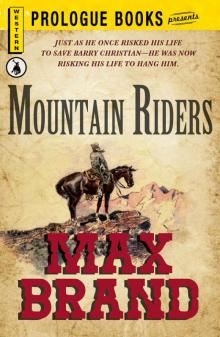 Mountain Riders
Mountain Riders Silvertip (1942)
Silvertip (1942)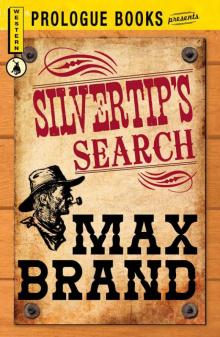 Silvertip's Search
Silvertip's Search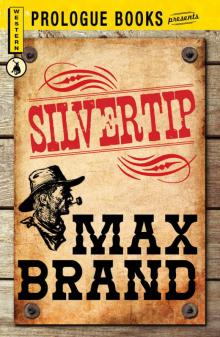 Silvertip
Silvertip Bull Hunter
Bull Hunter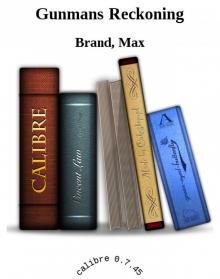 Gunmans Reckoning
Gunmans Reckoning The Seventh Man
The Seventh Man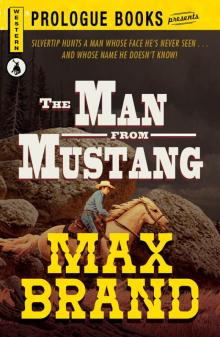 Man From Mustang
Man From Mustang Riders of the Silences
Riders of the Silences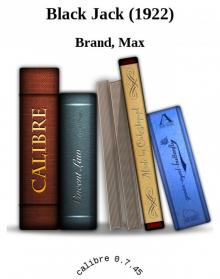 Black Jack (1922)
Black Jack (1922) Way of the Lawless
Way of the Lawless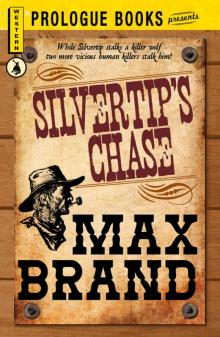 Silvertip's Chase
Silvertip's Chase Trailin
Trailin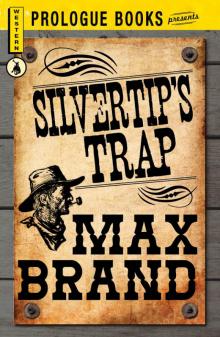 Silvertip's Trap
Silvertip's Trap Ronicky Doone (1921)
Ronicky Doone (1921) The Night Horseman
The Night Horseman the Garden Of Eden (1963)
the Garden Of Eden (1963)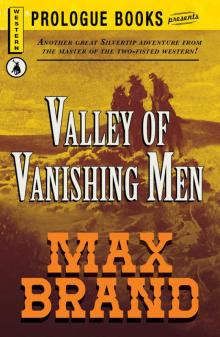 Valley of the Vanishing Men
Valley of the Vanishing Men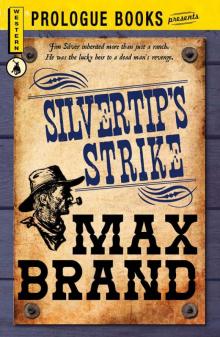 Silvertip's Strike
Silvertip's Strike Black Jack
Black Jack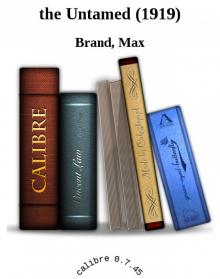 the Untamed (1919)
the Untamed (1919) Way Of the Lawless (1921)
Way Of the Lawless (1921) The Untamed
The Untamed